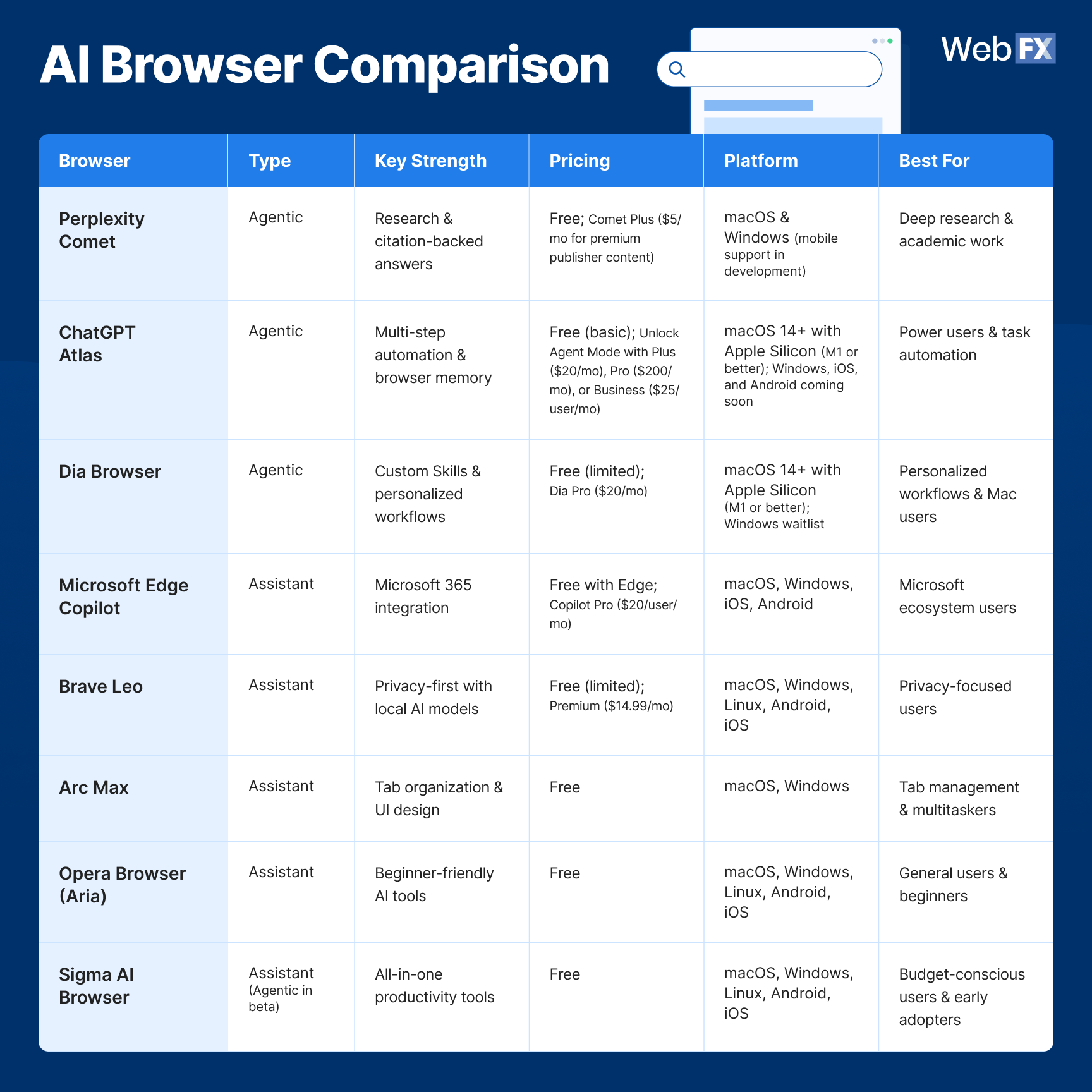-
 Published: Nov 17, 2025
Published: Nov 17, 2025
-
 26 min. read
26 min. read
-
Summarize in ChatGPT
-
 Albert Dandy Velasquez
Albert Dandy Velasquez Content Specialist
Content Specialist
- Albert Dandy Velasquez blends SEO strategy with compelling storytelling to help businesses boost their visibility and revenue online. With a B.A. in English and certifications from HubSpot, Semrush, and Google Analytics, he has written and optimized hundreds of articles on organic SEO, content strategy, and user experience. He regularly contributes to the WebFX blog and SEO.com, creating content that helps readers turn marketing goals into measurable results. When he’s off the clock, he’s usually exploring new neighborhoods on two wheels, filming travel content, or chasing golden hour with a coffee in hand.
Table of Contents
- What is an AI browser? (and why it’s changing the web)
- How we evaluated these AI browsers (our review criteria)
- AI browser comparison (at a glance)
- The 8 best AI browsers in 2026 (ranked & reviewed)
- #1 Perplexity Comet: The researcher’s dream
- #2 ChatGPT Atlas: The agentic powerhouse
- #3 Dia Browser: The personalized workflow browser
- #4 Microsoft Edge Copilot: The Microsoft ecosystem browser
- #5 Brave Leo: Privacy-first with AI brains
- #6 Arc Max: The tab organization master
- #7 Opera Aria: Smart, mainstream, and accessible
- #8 Sigma AI Browser: The all-in-one experimental player
- So which AI browser should you choose?
- For research & students
- For productivity & automation
- For privacy-first users
- For Microsoft power users
- For Mac users
- For "just getting started" with AI browsers
- For content creators
- FAQs about AI browsers in 2026
- Don’t just use AI browsers. Learn how to rank inside them.
- What is an AI browser and how does it differ from traditional browsers? An AI browser is a next-generation web browser with native artificial intelligence integration that interprets and acts on information rather than just displaying it (e.g., summarizing articles, answering questions, automating form-filling, and performing multi-step tasks like product research or price comparisons in real time).
- Which AI browser is best for research and academic work? Perplexity Comet excels at research by replacing traditional search with citation-backed answers from multiple sources, maintaining context across tabs, and synthesizing information automatically. It is ideal for students, researchers, journalists, and knowledge workers who need reliable, cited information quickly (free with optional Comet Plus at $5/month to access premium publisher content).
- What makes ChatGPT Atlas unique among AI browsers? ChatGPT Atlas features Agent Mode (currently in preview) that can autonomously perform multi-step workflows like filling forms, comparing products across tabs, and booking reservations, essentially giving ChatGPT hands to execute tasks on your behalf. Although it currently only works on macOS 14+ with Apple Silicon M1+, and requires a paid subscription ($20-$200/month) to unlock Agent Mode.
- Which AI browser offers the best privacy protection? Brave Leo provides best-in-class privacy by routing requests through anonymizing servers, offering local model processing options, requiring no login, not storing prompts, and hiding your IP address. It is ideal for privacy-conscious users who want AI assistance without data tracking (free with Leo Premium at $14.99/month for advanced features).
- How should businesses prepare for AI browsers changing search behavior? Businesses need generative engine optimization (GEO) strategies to ensure their content gets cited by AI systems, since AI browsers synthesize answers and cite trusted sources rather than showing traditional search results. This means brands not appearing in AI citations (and not optimizing for it) miss an entire generation of searchers who never see standard search results pages.
The arrival of AI browsers has taken the Internet experience by storm.
Gone are the days of opening a dozen tabs just to compare flights, copying and pasting between documents, and manually hunting for promo codes at checkout (all while your traditional browser just sits there, watching you struggle).
With AI web browsers, you can directly ask questions and get instant custom answers across your open tabs, automate multi-step tasks, and have an intelligent assistant that actually understands (and solves) what you’re trying to accomplish. But the thing is, there aren’t just a couple of AI browsers vying for your attention.
If you’ve heard about ChatGPT Atlas, Perplexity Comet, or Dia (trust me, the list goes on) and wondered which AI browser actually does the job, you’ve come to the right place. We did the research for you, and this AI browser comparison breaks down eight of the best AI browsers available in 2026, comparing features, pricing, privacy, and performance side-by-side to help you find the right fit.
Ready to find the best AI browser for your workflow? Let’s get down to brass tacks:
- What is an AI browser? (and why it’s changing the web)
- How we evaluated these AI browsers (our review criteria)
- AI browser comparison (at a glance)
- The 8 best AI browsers in 2026 (ranked & reviewed)
- So which AI browser should you choose?

AI Workspace for Business Teams
Imagine an AI workspace where you can collaborate with team members, share prompts, and leverage personas for generative AI.
Empower My Team with AI
What is an AI browser? (and why it’s changing the web)
An AI browser is a next-generation web browser built with native artificial intelligence (AI) integration (not just plug-ins or extensions). Instead of acting as a static window to the Internet, an AI web browser works as an intelligent assistant that understands context, remembers actions across tabs, and helps you complete tasks faster.
Here’s the key difference: Traditional browsers display information, but AI browsers interpret it. They summarize articles, answer questions, automate form-filling, and even perform multi-step tasks like researching products or comparing prices, all in real time.
Today’s best AI browsers generally fall into two types:
- Smart assistant browsers enhance your workflow with built-in chat, summarization, and quick answers. Examples include Arc Max, Brave Leo, and Microsoft Edge with Copilot.
- Agentic browsers take it a step further by browsing, acting, and completing tasks for you. ChatGPT Atlas, Perplexity Comet, and Dia lead this frontier.
This shift marks the evolution from search-based to AI-assisted browsing. Instead of finding links, your browser now finds synthesized answers, turning the Internet into an interactive, personalized experience designed to think and act alongside you.
How we evaluated these AI browsers (our review criteria)
The AI browser war has officially begun. And to determine which one truly earns the title of best in 2026, we evaluated each option across six key criteria:
- Core AI features: What can the browser actually do? Does it summarize content, automate tasks, or answer questions? We assessed the depth and usefulness of each AI capability.
- Speed and performance: How quickly does the AI respond? Does the browser slow down during heavy use? Performance matters when you’re trying to work efficiently.
- Privacy and data handling: Where does your data go? Is AI processing local or cloud-based? Can you opt out of data collection? Privacy policies reveal how each browser treats your information.
- Pricing and accessibility: Is it free or subscription-based? What features are locked behind paywalls? We examined the cost-to-value ratio for each AI browser.
- Platform availability: Does it work on Windows, Mac, Linux, or mobile? Many AI browsers currently limit platform support.
- Use case fit: Which browser excels at research versus automation versus privacy? Different AI web browsers serve different needs.
This AI browser comparison draws from official documentation, user reviews, publicly available testing data, and hands-on analysis to give you an accurate and comprehensive breakdown of your options
AI browser comparison (at a glance)
Before diving into the full reviews, here’s a quick look at how all eight AI browsers compare across core features, pricing, and platform support.

Source Data
| Browser | Type | Key Strength | Pricing | Platform | Best For |
| Perplexity Comet | Agentic | Research & citation-backed answers | Free; Comet Plus ($5/mo for premium publisher content) | macOS & Windows (mobile support in development) | Deep research & academic work |
| ChatGPT Atlas | Agentic | Multi-step automation & browser memory | Free (basic); Unlock Agent Mode with Plus ($20/mo), Pro ($200/mo), or Business ($25/user/mo) | macOS 14+ with Apple Silicon (M1 or better); Windows, iOS, and Android coming soon | Power users & task automation |
| Dia Browser | Agentic | Custom Skills & personalized workflows | Free (limited); Dia Pro ($20/mo) | macOS 14+ with Apple Silicon (M1 or better); Windows waitlist | Personalized workflows & Mac users |
| Microsoft Edge Copilot | Assistant | Microsoft 365 integration | Free with Edge; Copilot Pro ($20/user/mo) | macOS, Windows, iOS, Android | Microsoft ecosystem users |
| Brave Leo | Assistant | Privacy-first with local AI models | Free (limited); Premium ($14.99/mo) | macOS, Windows, Linux, Android, iOS | Privacy-focused users |
| Arc Max | Assistant | Tab organization & UI design | Free | macOS, Windows | Tab management & multitaskers |
| Opera Browser (Aria) | Assistant | Beginner-friendly AI tools | Free | macOS, Windows, Linux, Android, iOS | General users & beginners |
| Sigma AI Browser | Assistant (Agentic in beta) | All-in-one productivity tools | Free | macOS, Windows, Linux, Android, iOS | Budget-conscious users & early adopters |
The 8 best AI browsers in 2026 (ranked & reviewed)
AI browsers do very different things. So the real question here is which one actually fits your workflow. Below is an in-depth rundown of all eight AI browsers with honest pros, cons, pricing, and who should (and shouldn’t) use each one:

The 8 best AI browsers in 2026:
- Perplexity Comet: The researcher’s dream
- ChatGPT Atlas: The agentic powerhouse
- Dia Browser: The personalized workflow browser
- Microsoft Edge Copilot: The Microsoft ecosystem browser
- Brave Leo: Privacy-first with AI brains
- Arc Max: The tab organization master
- Opera Aria: Smart, mainstream, and accessible
- Sigma AI Browser: The all-in-one experimental player
#1 Perplexity Comet: The researcher’s dream
Perplexity Comet is what happens when a search engine company builds a browser. Launched in July 2025 and made free globally that October, Comet replaces Google’s search entirely with Perplexity’s AI engine, turning every query into a cited, multi-source answer instead of blue links. The result is a browser that doesn’t just take you to information. It synthesizes it, cites it, and helps you act on it.
Comet treats research like a conversation. Ask about quantum computing, and it pulls information from multiple sources, provides inline citations, and maintains context as you explore tangents across tabs. Need to compare mortgage rates? Comet can scan multiple bank sites, extract key terms, and summarize everything for you in seconds.
Perplexity Comet key features:
- Citation-backed answers: Every response includes inline sources for trustworthy research
- Contextual understanding: Comet keeps track of your ongoing task or query and adapts as you explore
- Voice interaction: Ask questions hands-free and get spoken responses
- Action-based AI tasks: Use AI to organize tabs, draft replies, create study plans, build simple web assets, or shop for products
- Free globally: No paywalls for core features (optional Comet Plus at $5/mo adds premium publisher access)
Strengths:
- Best-in-class research capabilities: Automatic citations and source synthesis save hours of manual searching
- Genuinely free: Most powerful features cost nothing; Comet Plus only applies to premium publisher content
- Cross-platform availability: Works on both Mac and Windows, with mobile in development
- Versatile assistant: “AI that understands, organizes, builds, emails, creates, shops” matches a wide range of tasks
Weaknesses:
- Requires granting data access for AI tasks: Some features need permission to analyze on-screen content. While user-controlled, it’s not as privacy-focused as Brave Leo.
- Interface feels generic: Comet’s design closely resembles Chrome with a dark theme. If you’re hoping for Arc’s innovative UI or Dia’s fresh approach, you’ll be disappointed by the conservative aesthetic.
- Still evolving: As a relatively new browser (fully launched October 2025), some features feel experimental, and occasional bugs pop up during heavy research sessions.
Best for:
Students, researchers, journalists, and knowledge workers who spend hours diving into complex topics and need reliable, cited information fast. Comet shines when you’re comparing options (insurance plans, product specs, academic papers), following research rabbit holes, or building arguments that require source credibility. If “cite your sources” is a regular part of your workflow, Comet eliminates the tedious copy-paste-format loop.
Pricing:
- Free: Full browser access with unlimited AI search, citations, cross-tab context, and agentic features
- Comet Plus: $5/month (adds access to premium publisher content from partners like The New York Times, Wired, and Condé Nast publications)
- Note: Perplexity Pro ($20/mo) is a separate subscription for the Perplexity search engine with advanced AI models, and it’s not required for the Comet browser.
What users are saying:
The reception has been overwhelmingly positive, especially from people frustrated with traditional search. Users consistently praise the citation feature and research efficiency, with many calling it a “game-changer” for academic work. The main criticisms focus on the generic interface and occasional context-switching confusion when Comet tries to maintain awareness across too many tabs.
What is your Experience Using the New Perplexity Comet Browser??
byu/viewfan66 inPerplexityComet
#2 ChatGPT Atlas: The agentic powerhouse
Launched in October 2025, ChatGPT Atlas is OpenAI’s Chromium-based browser built from the ground up with ChatGPT woven into every interaction. Unlike traditional browsers with AI bolted on, Atlas puts ChatGPT directly in your sidebar, ready to understand what you’re viewing, remember context across sessions, and execute actions through Agent Mode.
Atlas is ChatGPT with hands. It can fill forms, compare products across tabs, book reservations, and handle workflows that normally require dozens of clicks. Every tab becomes a workspace where AI can read, act, and automate on your behalf.
ChatGPT Atlas key features:
- Agent Mode (preview): Performs multi-step workflows (open tabs, navigate sites, fill forms, compare products) under your supervision
- Browser memories: Remembers key details from sites you visit (stored for 30 days and fully user-controlled)
- Context-aware sidebar: ChatGPT understands your current page without copying/pasting
- Inline writing assistance: Highlight text to rewrite, refine, or generate suggestions
- Multi-modal search modes: Search using text, images, videos, or news sources directly from the browser
Strengths:
- One of the most powerful automation systems available: Agent Mode can genuinely complete workflows like researching, comparing, and shopping end-to-end
- Persistent context across sessions: Browser memory lets Atlas recall preferences and details you choose
- Genuine productivity gains: Ideal for users who delegate repetitive online tasks
Weaknesses:
- macOS-only availability: Atlas only runs on macOS 14+ with Apple Silicon (M1+). Windows, iOS, and Android versions are “coming soon” with no firm timeline.
- Agent Mode accuracy issues: Agent Mode shows promise, but has typical new-feature growing pains and occasionally makes mistakes during complex automation.
- Premium features locked behind paywalls: The free version feels limited, with Agent Mode requiring Plus, Pro, or Business subscriptions.
Best for:
Mac users who spend significant time on repetitive web tasks like form filling, product research, booking travel, or managing workflows across multiple sites. Atlas makes the most sense for professionals and power users who can justify the premium cost with measurable time savings. If you’re already a ChatGPT Plus or Pro subscriber and use a Mac, Atlas is essentially a no-brainer upgrade.
Pricing:
- Free: Limited features, basic ChatGPT Atlas access
- Plus: $20/month (unlocks Agent Mode preview)
- Pro: $200/month (higher rate limits, priority access)
- Business: Starting at $25/user/month (team features, admin controls)
- Note: Agent Mode requires a paid subscription (Plus, Pro, or Business)
What users are saying:
Reddit and tech forums show cautious excitement mixed with practical concerns. The macOS-only requirement frustrates Windows users, and several people mention Agent Mode’s accuracy issues. The consensus is that if you’re deep in the Apple ecosystem and already paying for ChatGPT, Atlas delivers. For everyone else, the wait-and-see approach makes sense until broader platform support arrives.
#3 Dia Browser: The personalized workflow browser
Dia Browser is The Browser Company’s AI-first experiment, a radical departure from their beloved Arc browser. Launched in beta in June 2025 and now offering a Pro tier, Dia strips away Arc’s power-user complexity in favor of simplicity with AI woven throughout. The URL bar doubles as your command center: Type a website, run a search, or give the AI an instruction.
What makes Dia unique is its “Skills” system: Customizable AI shortcuts you create by simply asking. Tell Dia “I want a distraction-free reading mode that removes sidebars and ads,” and it builds that skill for you. Need to auto-fill job applications using your resume? Create a skill. Want to summarize emails in your tone of voice? Another skill. It’s browser automation without the intimidating learning curve.
Dia Browser key features:
- Skills system: Create custom AI-powered shortcuts for repetitive tasks by describing what you want in plain language
- Context-aware AI sidebar: Understands your open tabs, browsing history, and can act across multiple sites
- URL bar as command center: Navigate, search, or prompt the AI, all from one input field
- Privacy-focused by design: Browsing data encrypted locally, minimal server processing, deletable at any time
- Built on Arc’s foundation: Inherits Arc’s stability and Chromium compatibility while simplifying the interface
Strengths:
- Customization without complexity: The Skills feature democratizes browser automation, no coding required, just describe what you need in plain English.
- Privacy-conscious AI implementation: Unlike Comet or Atlas, Dia encrypts data locally and gives you granular control over what the AI can access.
- Perfect for Arc refugees: If you loved Arc’s innovation but found it overwhelming, Dia delivers the AI benefits without the learning curve.
Weaknesses:
- Limited platform availability: Dia currently runs only on macOS 14+ with Apple Silicon (M1+). A Windows waitlist exists, but there’s no confirmed release timeline. Linux, iOS, and Android support hasn’t been announced.
- Early-stage product: As a recently launched browser, Dia has areas that need polishing. Skills occasionally misfire, and complex AI requests don’t always land perfectly.
- Pro tier required for unlimited use: The free tier has usage limits on AI features. Dia Pro ($20/mo) unlocks unlimited AI chat and Skills.
Best for:
Mac users who want a personalized AI agent that learns their habits without manual setup. Dia excels for people with repetitive browser workflows like content creators who need consistent formatting, researchers who visit the same sites daily, or professionals who fill similar forms repeatedly. If you found Arc too complex but love the idea of a smarter browser, Dia is your entry point.
Pricing:
- Free: Limited AI usage
- Dia Pro: $20/month (unlimited AI chat and Skills, priority features)
What users are saying:
The response from early adopters has been cautiously optimistic. Users praise the Skills concept and appreciate Dia’s cleaner interface compared to Arc, but many note it has some rough edges, and the AI occasionally misunderstands complex Skills instructions. The macOS-only limitation and $20/mo Pro tier have drawn criticism, especially since Comet offers similar features for free.
#4 Microsoft Edge Copilot: The Microsoft ecosystem browser
Microsoft Edge Copilot isn’t just a browser with AI sprinkled in. It’s strategically designed to be the front door into Microsoft’s AI ecosystem. Built on Chromium and deeply integrated across Windows 11, Microsoft 365, and Bing, Copilot transforms Edge into a productivity dashboard where AI can draft emails, summarize documents, rewrite text, generate images, and even assist with coding right inside the browser.
Unlike Atlas or Comet, Edge Copilot doesn’t try to reinvent browsing. Instead, it supercharges the traditional browser with enterprise-grade AI tools that seamlessly connect to your work apps, including Outlook, Word, Excel, Teams, OneDrive, and SharePoint. For power users and enterprise environments, this level of integration is where Copilot shines.
Microsoft Edge Copilot key features:
- Native Microsoft 365 integration: Seamlessly works across Word, Excel, PowerPoint, Outlook, and Teams for cross-app AI support
- Copilot Mode: A dedicated browsing mode that surfaces AI tools as you work, helping you stay focused and get things done faster
- Copilot Vision: Screen-level understanding that analyzes the content on your screen (including open tabs and documents) to offer contextual suggestions
- Copilot Actions: Rewrite text, summarize pages, extract insights, generate images, unsubscribe from emails, autofill simple forms, and complete lightweight workflow tasks
- Voice commands: Ask questions, navigate tasks, or generate content hands-free
- Free tier included: Core Copilot features available to all Edge users
Strengths:
- Best-in-class Microsoft integration: If you’re already using Microsoft 365, Copilot is the only AI browser that genuinely connects your browser to your entire workspace. Move seamlessly between web research and document creation.
- Completely free for basic features: Unlike Atlas or Dia Pro, Edge Copilot’s core functionality costs nothing. The free tier delivers real value without hitting paywalls.
- Cross-platform availability: Works on Windows, Mac, iOS, and Android. No Apple Silicon requirements or platform restrictions.
- Strong for enterprise environments: IT-friendly, secure, and built for productivity workflows.
Weaknesses:
- Copilot Actions are still inconsistent: The automation features are hit-or-miss. Users report Actions claiming to complete tasks that didn’t actually execute, requiring manual verification.
- Privacy concerns for non-Microsoft users: Edge collects browsing data to improve Copilot, and for privacy-conscious users outside the Microsoft ecosystem, this integration could feel invasive.
- Best features require Microsoft 365: While basic Copilot is free, the deep productivity features that make it compelling require an active Microsoft 365 subscription.
Best for:
Windows users and Microsoft 365 subscribers who want AI assistance without switching browsers or ecosystems. Edge Copilot excels for office workers juggling email, documents, and web research simultaneously. If you’re already paying for Microsoft 365 and spend your day in Outlook, Teams, and Office apps, Copilot eliminates the friction of copying information between your browser and productivity tools.
Pricing:
- Free: Basic Copilot features in Edge browser (summarization, chat, basic automation)
- Microsoft 365 Personal/Family: $6.99-12.99/month (includes enhanced Copilot features)
- Copilot Pro: $20/user/month (priority access to latest AI models, faster responses, Copilot in Microsoft 365 apps)
- Note: Copilot Pro is a separate subscription from Microsoft 365, but it works best when combined with it.
What users are saying:
User reaction is mixed and highly dependent on existing Microsoft investment. Microsoft 365 users appreciate the seamless integration and find genuine productivity gains, especially when moving between web research and document creation. However, users outside the Microsoft ecosystem find Edge Copilot less compelling than Comet or Atlas.
Edge’s Co-Pilot AI is Amazing! Here is an example I was extremely impressed about.
byu/quadratusMinerva inmicrosoft
#5 Brave Leo: Privacy-first with AI brains
Brave Leo is the built-in AI assistant inside the Brave Browser, and true to Brave’s philosophy, it’s designed to give you AI without sacrificing privacy. Unlike most AI browsers that rely heavily on cloud processing, Leo routes requests through an anonymizing server and offers local model options, so your prompts aren’t tied to your identity.
Leo isn’t trying to automate your entire workflow like Atlas or reinvent research like Comet. Instead, it enhances everyday browsing: Summarizing pages, answering questions, generating text, and translating content, all while keeping your data shielded from tracking.
Brave Leo key features:
- Privacy-first architecture: Requests pass through Brave’s relay server, hiding your IP address
- Emerging local model support: Brave is rolling out on-device processing options to reduce cloud exposure
- Webpage & document summarization: Summarize articles, PDFs, Google Docs, sheets, and more
- Writing & rewriting tools: Improve tone, clarity, or shorten/expand text on any page
- Multimodal support: Can analyze images and transcript-based video content depending on the model
- Model flexibility: Choose from Brave’s models (Mixtral), Llama, and others
- No login required: Use Leo immediately, no Brave account needed
Strengths:
- Best-in-class privacy: No login required, prompts aren’t stored, and your IP is hidden through Brave’s relay. For privacy-first users, this is unmatched by mainstream AI browsers like Edge, Comet, or Atlas.
- Free tier is genuinely useful: Summaries, rewriting tools, and chat all work without paying.
- Works everywhere: Available on Windows, macOS, Linux, iOS, and Android.
- Local models reduce data exposure: Ideal for users uncomfortable sending data to OpenAI or Perplexity.
Weaknesses:
- No agentic capabilities: Leo can’t automate tasks, fill forms, or browse on your behalf.
- Less powerful for research: Output quality depends on the model you choose. It’s not built to gather multi-source insights automatically.
- Premium tier required for best models: Leo Premium unlocks faster speeds and access to advanced models.
- UI is minimal: Leo feels like a sidebar tool rather than a reinvented browser experience.
Best for:
Users who want AI assistance without giving up privacy. Brave Leo is ideal for privacy-conscious researchers, journalists, students, and everyday users who need summaries, rewriting tools, and quick answers, but don’t need full automation or deep contextual workflows. If you want AI without being tracked, Brave Leo is the only browser that makes privacy a core design principle rather than an afterthought.
Pricing:
- Free: Full access to Leo with standard models (daily usage limits apply)
- Leo Premium: $14.99/month (faster responses, higher-quality models, and early access to new features)
What users are saying:
Users frequently highlight Leo’s privacy stance as the #1 reason to use it. Many appreciate that Brave doesn’t require login or store prompts, which feels refreshing compared to other AI tools. The main complaints revolve around Leo’s lack of automation and occasional slower responses compared to Atlas or Comet.
Brave’s Leo AI is Getting Smarter, Has Anyone Noticed the Improvements?
byu/Toxon_gp inbrave_browser
#6 Arc Max: The tab organization master
Arc Max is the AI-enhanced upgrade to the Arc browser, a sleek, modern alternative to Chrome that’s built around sidebars, spaces, and fluid tab organization. Instead of reinventing search or automation like Atlas or Comet, Arc Max focuses on making your everyday browsing cleaner, faster, and less overwhelming.
Launched in late 2023, Arc Max adds a suite of lightweight AI tools (called Max AI) designed to help you stay organized, summarize content, and reduce friction while browsing. It’s not an agentic browser, and it doesn’t try to be. Arc Max is all about productivity, clarity, and calm.
Arc Max key features:
- 5 Second Previews: Hover and tap Shift to generate an instant preview of any link
- Ask ChatGPT: Access ChatGPT from the Command Bar (requires your own ChatGPT login)
- Tidy Tab Titles: Automatically shortens and cleans up tab titles when you pin them
- Tidy Downloads: Smartly renames downloaded files for easier organization
- Sidebar Spaces: Create separate spaces for work, personal, research, or projects
- Minimalist, distraction-free UI: Arc’s signature design philosophy
Strengths:
- The best UI/UX of any browser: Clean, modern, and designed for people who juggle dozens of tabs.
- AI that stays out of the way: Tools are helpful but optional, great for users who don’t want “AI everywhere.”
- Powerful organization features: Spaces, profiles, and auto-tidying genuinely reduce clutter.
- Cross-platform availability: Works on macOS and Windows without hardware restrictions.
Weaknesses:
- Not truly “AI-first”: Arc Max doesn’t offer agentic browsing, autonomous actions, or deep research like Atlas or Comet.
- Limited AI depth: Its AI tools are mostly summaries and search enhancements. Nothing advanced.
- Learning curve: Arc’s innovative design can feel strange for long-time Chrome users.
- No mobile version: Arc Max works only on macOS and Windows. The Browser Company offers a separate mobile app called Arc Search for iOS and Android, but it’s a different product with limited features.
Best for:
Power users, multitaskers, creatives, and anyone drowning in tabs. Arc Max is ideal for people who want a streamlined browser with light AI enhancements rather than a full-on AI assistant. If UI, workflow cleanliness, and tab management matter more than automation, Arc Max hits the sweet spot.
Pricing:
- Free: All core features + Max AI tools
- No paid tier required for AI features
What users are saying:
Users love Arc’s design-first philosophy. Many say it feels like the first browser built for modern multitasking, not the early 2000s. The biggest praise goes to Spaces, Tidy Tabs, on-page search tools, and the fact that all these are truly free. The biggest complaints revolve around the learning curve and the fact that Arc Max’s AI tools aren’t nearly as powerful as Comet or Atlas. In short, more “convenience,” less “mind-blowing automation.”
#7 Opera Aria: Smart, mainstream, and accessible
Opera’s Aria is one of the earliest AI assistants built directly into a mainstream browser, long before “AI browser” became a 2025 buzzword. Instead of going the agentic route like Atlas or the research-heavy path like Comet, Opera Aria focuses on everyday usability with quick answers, content summaries, writing help, and simple automation, all inside a familiar, Chrome-like environment.
It’s the most accessible AI browser on this list that’s completely free, available across all major platforms, and easy to use for both casual and power users who want AI without switching ecosystems. Unlike Arc Max or Brave Leo, Opera balances mainstream browser comfort with a genuinely capable AI assistant. If you want a “Chrome but smarter” experience, Aria is the closest match.
Opera Aria key features:
- AI Sidebar (Aria): Ask questions, summarize pages, generate text, images, or debug code without leaving your tab
- Command Line access: Quick AI access with Ctrl+/ or Cmd+/ with modes for Page Context and Writing
- Tab Commands (agentic AI): Tell Aria to organize, group, close, pin, or save tabs automatically
- AI image generation & understanding: Create images from text prompts or upload photos for Aria to analyze, transcribe, or identify
- AI Prompts feature: Highlight text anywhere to rewrite, shorten, explain, or ask questions about it
- Text-to-speech: Aria reads answers aloud in multiple languages for accessibility
- Multiplatform support: Available for Windows, macOS, Linux, iOS, and Android
- Flow cross-device syncing: Send AI-generated notes, links, or summaries seamlessly between devices
Strengths:
- Fully free AI assistant: No subscription, no paywall, no usage limits
- Extremely accessible: Works on all major platforms, including Linux and mobile, unlike Atlas or Dia
- Beginner-friendly: Ideal for users who want AI tools without learning a new browser paradigm
- Great for everyday tasks: Summaries, rewriting, quick answers, simple research
- Stable Chromium foundation: Compatible with Chrome extensions and familiar to most users
Weaknesses:
- Limited agentic scope: While Aria has Tab Commands for browser organization, it can’t automate complex workflows, fill forms across websites, or perform multi-step tasks like Atlas or Comet
- AI isn’t context-aware across tabs: Lacks cross-tab synthesis or deep research abilities beyond individual pages
- Basic compared to specialized AI browsers: Good generalist but not a standout in power features like automation or research depth
- Mobile version has limitations: Still useful, but less capable than the desktop version
Best for:
Casual users, students, and general web surfers who want a smart, AI-enhanced Chrome alternative without subscriptions or a complicated learning curve. If you just want quick answers, article summaries, or help writing emails, Opera Aria delivers (no ecosystem shift mandatory).
Pricing:
- Free: 100% of Opera Aria features
- No paid tier required for AI features
- Premium Opera features (VPN Pro, etc.) are optional but not related to AI
What users are saying:
Opera Aria receives praise for being “surprisingly capable” for a free assistant. Users love the simplicity and the Chrome-extension compatibility. Common critiques point to its lack of automation compared to Atlas, limited research depth versus Comet, and occasional reliability issues with complex questions.
Aria is the best and worst AI i’ve ever used
byu/Nuuuuuudah inOperaGX
#8 Sigma AI Browser: The all-in-one experimental player
Sigma AI Browser is the wildcard on this list, an ambitious AI-first agentic browser that turns your browser into an “action engine.” Unlike traditional browsers with AI assistants, Sigma’s AI Agent can log into websites, click buttons, fill forms, and complete tasks inside websites like a real assistant. Launched with its AI Agent feature in beta (public release scheduled for late 2025), Sigma attempts to combine automation, deep research, and content creation tools in one free package.
Built on Chromium’s reliable foundation, Sigma positions itself as the free alternative to Atlas and Comet, offering agentic browsing capabilities without the subscription cost. It’s the scrappy underdog testing what an AI browser can be when freed from corporate constraints, targeting early adopters, students, and creators willing to trade polish for cutting-edge AI features at zero cost.
Sigma AI Browser key features:
- AI Agent (beta): Automates tasks by logging into sites, clicking, typing, and completing workflows across Gmail, Amazon, Jira, and other platforms
- Deep Research mode: Scours journals, datasets, and expert sources to generate citation-rich insights for academic or market research
- SigmaGPT chat: Built-in AI assistant for instant summaries, content generation, and answering questions
- Writing Assistant: Get suggestions, rephrase sentences, craft social media posts, or refine your writing
- Memory-based actions: The agent recalls key data and applies it wherever needed across tasks
- End-to-end encryption: All AI conversations are encrypted, with no tracking, profiling, or data used for ads
Strengths:
- Completely free: All features available at no cost, including agentic automation that Atlas charges $20-200/mo for
- True agentic capabilities: AI Agent can log in, navigate sites, and complete multi-step tasks autonomously
- Privacy-focused: End-to-end encryption, no tracking, GDPR/CCPA compliant
- Cross-platform availability: Works on Windows, macOS, Linux, Android, and iOS
Weaknesses:
- AI Agent is still in beta: The most compelling feature (autonomous agent) is scheduled for public beta in late 2025, making it unavailable for most users currently.
- Lacks polish: As an experimental browser, Sigma feels rough compared to Arc Max or Edge Copilot. Features can be inconsistent.
- Smaller community: Limited documentation, fewer resources, and minimal third-party support compared to mainstream browsers.
- Uncertain reliability: Users report occasional instability during heavy use and erratic AI responses.
Best for:
Early adopters, students, content creators, and budget-conscious users who want agentic browsing features without paying for Atlas, Dia Pro, or other premium AI browsers. If you’re willing to work with beta software and occasional bugs in exchange for free automation, Sigma offers a compelling value proposition.
Pricing:
- Free: All features included at no cost, including AI Agent access when it launches
- No premium tier currently exists
What users are saying:
Sigma flies under the radar in most AI web browser discussions, which means user feedback is limited. Early testers appreciate the ambitious feature set and free access to automation that competitors charge for. The main excitement centers on the upcoming AI Agent beta launch.
So which AI browser should you choose?
There’s no single “best” AI browser, only the best one for your workflow. Here’s the definitive breakdown per use case based on real capabilities, platform limits, and the strengths we covered above:
For research & students
Best: Perplexity Comet
Runner-up: ChatGPT Atlas
Why:
- Comet’s citation-backed answers, cross-tab context, and research-grade synthesis make it unmatched for academic or deep research tasks.
- Atlas comes close thanks to its context awareness and automation, but it’s limited by macOS availability and paywalled Agent Mode.
For productivity & automation
Best: ChatGPT Atlas
Runner-up: Dia
Why:
- Atlas has the strongest automation stack (Agent Mode, browser memories, tab-level conversations, page-aware sidebar).
- Dia is the closest alternative with Skills for custom automation, but its ecosystem is still maturing and requires Pro for unlimited use.
For privacy-first users
Best: Brave Leo
Runner-up: Opera Aria
Why:
- Brave Leo anonymizes queries through relay servers, offers experimental local AI models, and requires no login or data storage.
- Opera Aria processes most tasks locally and doesn’t require an account for basic features.
For Microsoft power users
Best: Microsoft Edge Copilot
Why:
- Seamless integration with Word, Excel, PowerPoint, Outlook, OneDrive, Teams, and Windows 11.
- Basic Copilot features are free, though the best productivity integrations require Microsoft 365.
For Mac users
Best: Dia
Runner-up: Perplexity Comet
Why:
- Dia offers the most polished macOS-native experience with Skills for custom automation and Arc’s DNA.
- Comet works great on Mac, is completely free, and delivers powerful agentic features without platform restrictions.
For “just getting started” with AI browsers
Best: Opera Aria
Runner-up: Brave Leo
Why:
- Both are free, stable, and don’t require signups or subscriptions to use core AI features.
- Opera Aria gives you a guided, beginner-friendly AI experience with image generation and tab commands.
- Brave Leo offers strong privacy without complexity
For content creators
Best: Opera Aria
Runner-up: Arc Max
Why:
- Opera Aria’s AI image generation, content creation tools, writing assistant, and text-to-speech work reliably right now.
- Arc Max complements creators with beautiful UI, smart tab management, and fluid workflows (though less AI-heavy than Opera).
FAQs about AI browsers in 2026
What is an AI browser, and how is it different from Chrome or Safari?
An AI browser has artificial intelligence built directly into its core, not just added as an extension. Instead of showing you a list of blue links when you search, AI web browsers understand what you’re asking and give you direct answers with sources.
Traditional browsers (Chrome, Safari, Edge):
- Show you search results → you click links → you read pages → you decide
- Each tab is separate with no connection between them
- You manually copy/paste between tabs or apps
AI browsers (Atlas, Comet, Aria):
- Give you synthesized answers immediately with citations
- Understand context across all your open tabs
- Can take actions for you (filling forms, organizing tabs, booking reservations)
Hence, if you just want to visit websites, Chrome works fine. If you want AI to help you work faster, research smarter, and automate repetitive tasks, AI browsers deliver real-time savings.
Which AI browser is actually free with no hidden costs?
Completely free AI browsers with zero limitations:
- Perplexity Comet: Full agentic features, research capabilities, no paywall (seriously, it’s all free)
- Opera Aria: AI chat, image generation, tab commands, no account required
- Brave Leo: Privacy-first AI, free tier with reasonable daily limits
- Arc Max: All AI features free, no premium tier exists
Free with usage caps:
- Microsoft Edge Copilot: Free but best features require Microsoft 365 subscription
- Sigma AI Browser: Free now, but AI Agent feature still in beta
Not free:
- ChatGPT Atlas: Requires Plus ($20/mo), Pro ($200/mo), or Business subscription for Agent Mode
- Dia: Free tier exists but limited; Pro ($20/mo) needed for unlimited Skills
Can AI browsers actually automate tasks or just chat with me?
It depends on which AI browser you choose. There’s a huge difference between “assistant” and “agentic” browsers.
Agentic browsers (can automate tasks):
- ChatGPT Atlas: Logs into websites, fills forms, completes multi-step workflows
- Perplexity Comet: Can shop, book reservations, extract data across sites
- Dia: Creates custom “Skills” to automate repetitive tasks
- Sigma AI Browser: AI Agent (beta) promises full automation
Assistant browsers (chat only, no automation):
- Brave Leo: Summarizes pages, answers questions, but won’t take actions
- Arc Max: Organizes tabs, but can’t navigate websites for you
- Opera Aria: Has Tab Commands (limited automation), mostly chat-focused
- Edge Copilot: Helps with Microsoft apps but limited web automation
Are AI browsers safe? What about my privacy and data?
It depends on which AI browser you use and how much you value privacy vs. power.
Most private AI browser options:
- Brave Leo: Anonymizes prompts, offers local AI models, no login required, doesn’t store data
- Opera Aria: Uses Opera’s “Composer” system (cloud-based with local pre/post-processing)
- Sigma AI Browser: End-to-end encryption, GDPR compliant, no tracking
Privacy trade-offs for power:
- ChatGPT Atlas: Sends browsing data to OpenAI servers to enable Agent Mode and memory features. You can control access, but cloud processing is required.
- Perplexity Comet: Collects browsing data to improve AI responses and cross-tab context. Emphasizes “privacy-first” but still gathers significant data.
- Microsoft Edge Copilot: Collects browsing data to improve Copilot (and likely for Microsoft ecosystem integration). Not ideal for privacy purists.
Security risks: AI web browsers are bigger targets for hackers because they collect more user data. If breached, attackers could access login credentials, browsing habits, and personal information across multiple sites.
What to do:
- If privacy is non-negotiable: Use Brave Leo
- If you want power + reasonable privacy: Use Perplexity Comet (read their privacy policy carefully)
- If you trust the company: Atlas and Edge Copilot offer great features but require data sharing
Which AI browser is best for me? (quick decision guide)
Choose an AI browser based on your primary need:
- For research and academics: Perplexity Comet (citation-backed answers, free, cross-tab synthesis)
- For privacy: Brave Leo (anonymized prompts, local models, no tracking)
- For automation and productivity: ChatGPT Atlas, if you’re on Mac and already have a ChatGPT subscription; Perplexity Comet if you want free automation on Mac/Windows
- For simplicity and ease: Opera Aria (beginner-friendly, completely free, works everywhere)
- For Microsoft 365 users: Edge Copilot (seamless integration with Outlook, Word, Teams, etc.)
- For tab organization addicts: Arc Max (best UI, but limited AI compared to others)
- For budget-conscious experimenters: Sigma AI Browser (ambitious features, all free, but rough around the edges)
Do AI browsers work on my phone?
Mobile support for AI browsers is limited right now:
Full mobile apps available:
- Opera Aria: iOS and Android with most desktop features
- Brave Leo: iOS and Android (Premium covers 5 devices)
- Edge Copilot: iOS and Android
- Sigma AI Browser: iOS and Android (limited features vs desktop)
Desktop-only (no mobile yet):
- ChatGPT Atlas: macOS only (Windows, iOS, Android “coming soon”)
- Perplexity Comet: Mac/Windows only (mobile “in development”)
- Dia: macOS only (Windows waitlist, no mobile announced)
- Arc Max: Mac/Windows only (Arc Search is a separate mobile app)
If you need AI browsing on your phone right now, use Opera Aria, Brave Leo, or Edge Copilot. The powerful agentic browsers (Atlas, Comet, Dia) are still desktop-only.
Future-Proof Your SEO Strategy with OmniSEO®
Goodbye search engine optimization, hello search everywhere optimization.

Don’t just use AI browsers. Learn how to rank inside them.
AI browsers don’t work like Google. They don’t show ten blue links and let users pick. They read your content, synthesize an answer, and cite the sources they trust most. If your business isn’t showing up in those citations, you’re missing an entire generation of searchers who never even see a traditional search results page.
That’s exactly what we help solve at WebFX.
We’ve spent 30 years helping businesses like yours stay ahead of every major shift in digital marketing. Our team of 750+ experts specializes in generative engine optimization (GEO), making sure your brand becomes a trusted source by the AI systems people are now using to make decisions.
It’s time to make sure AI is talking about you. Contact us online or call 888-601-5359 to speak with a strategist today about how our next-gen GEO services can future-proof your brand’s AI visibility.
-
 Albert Dandy Velasquez blends SEO strategy with compelling storytelling to help businesses boost their visibility and revenue online. With a B.A. in English and certifications from HubSpot, Semrush, and Google Analytics, he has written and optimized hundreds of articles on organic SEO, content strategy, and user experience. He regularly contributes to the WebFX blog and SEO.com, creating content that helps readers turn marketing goals into measurable results. When he’s off the clock, he’s usually exploring new neighborhoods on two wheels, filming travel content, or chasing golden hour with a coffee in hand.
Albert Dandy Velasquez blends SEO strategy with compelling storytelling to help businesses boost their visibility and revenue online. With a B.A. in English and certifications from HubSpot, Semrush, and Google Analytics, he has written and optimized hundreds of articles on organic SEO, content strategy, and user experience. He regularly contributes to the WebFX blog and SEO.com, creating content that helps readers turn marketing goals into measurable results. When he’s off the clock, he’s usually exploring new neighborhoods on two wheels, filming travel content, or chasing golden hour with a coffee in hand. -

WebFX is a full-service marketing agency with 1,100+ client reviews and a 4.9-star rating on Clutch! Find out how our expert team and revenue-accelerating tech can drive results for you! Learn more
Try our free Marketing Calculator
Craft a tailored online marketing strategy! Utilize our free Internet marketing calculator for a custom plan based on your location, reach, timeframe, and budget.
Plan Your Marketing Budget
Table of Contents
- What is an AI browser? (and why it’s changing the web)
- How we evaluated these AI browsers (our review criteria)
- AI browser comparison (at a glance)
- The 8 best AI browsers in 2026 (ranked & reviewed)
- #1 Perplexity Comet: The researcher’s dream
- #2 ChatGPT Atlas: The agentic powerhouse
- #3 Dia Browser: The personalized workflow browser
- #4 Microsoft Edge Copilot: The Microsoft ecosystem browser
- #5 Brave Leo: Privacy-first with AI brains
- #6 Arc Max: The tab organization master
- #7 Opera Aria: Smart, mainstream, and accessible
- #8 Sigma AI Browser: The all-in-one experimental player
- So which AI browser should you choose?
- For research & students
- For productivity & automation
- For privacy-first users
- For Microsoft power users
- For Mac users
- For "just getting started" with AI browsers
- For content creators
- FAQs about AI browsers in 2026
- Don’t just use AI browsers. Learn how to rank inside them.

See AI Marketing in Action
Explore how WebFX helped a regional brand get discovered in AI search experiences — proving what’s possible with today’s AI-driven marketing!

Proven Marketing Strategies
Try our free Marketing Calculator
Craft a tailored online marketing strategy! Utilize our free Internet marketing calculator for a custom plan based on your location, reach, timeframe, and budget.
Plan Your Marketing Budget
What to read next




